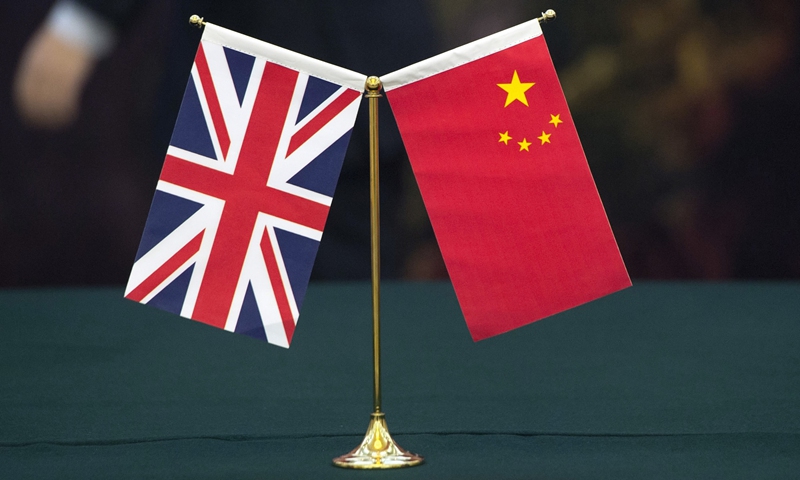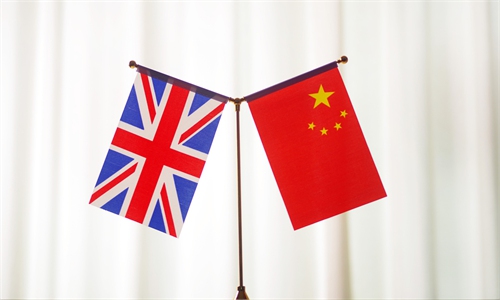British companies gain more confidence in the Chinese economy on the back of higher predictability: envoy

China UK Photo: VCG
A more predictable Chinese market, driven by the optimization of the country's epidemic response and the pent-up demand, has drawn more attention from British companies eager to embrace an array of opportunities in the world's second largest economy, the Global Times learned from UK's trade envoy in China, indicating a brighter outlook from the British private sector toward bilateral trade and investment.
But even as UK companies are upbeat about the Chinese market, there are also growing concerns about worsening bilateral diplomatic relations between the UK and China as London appears to show increasing intent on joining the US' containment strategy against China, analysts noted. To fully tap the vast potential for mutually beneficial economic cooperation, sound China-UK ties free of external meddling are crucial, they added.
In an exclusive interview with the Global Times, John Edwards, the UK Trade Commissioner for China, told the Global Times that British companies are feeling more confident about the Chinese economy and the market in 2023 than they did in 2022, with many expecting to expand investment and trade cooperation.
The remark reflects new optimism in the Chinese market following the optimization of the country's epidemic response and the gradual unleashing of pent-up demand.
Edwards said that the optimized epidemic policy has fundamentally changed the outlook toward China's economy in an extremely positive direction.
The positive outlook for China-UK trade and investment came as high-level government officials from both sides look to jointly promote bilateral relations in the post-pandemic era.
On the sidelines of the Munich Security Conference over the weekend, senior diplomats from China and Britain pledged to enhance cooperation, the Xinhua News Agency reported.
Wang Yi, director of the Office of the Foreign Affairs Commission of the Communist Party of China Central Committee, said while meeting with James Cleverly, British Secretary of State for Foreign, Commonwealth and Development Affairs on Saturday that there are no geopolitical conflicts between China and Britain, and the two economies complement each other, offering great potential, the report said.
Wang urged both sides to remove all kinds of obstructions, stick to the right direction and promote the healthy development of bilateral relations.
Greater confidence
China's shift in COVID response, followed by the release of pent-up demand, has injected new impetus into the market and helped foreign companies including those from the UK to restore more confidence into the economy, exemplified by the recent moves of the British companies toward China.
Speaking with the Global Times in a recent interview, Edwards said that "we're already started seeing British companies' global CEOs that haven't been here three years flying in. Teams that haven't been back to headquarters for years flying out, and Chinese investors are also flying out."
Not just people, but also products have witnessed changing conditions. For example, last week, some of the British fish processing plants that do seafood for Chinese market haven't been able to export to China for a number of years and now they are able to export to China, the trade commissioner said.
The most important thing for business is always predictability in which "the Chinese economy in the market has become more predictable, and therefore, more business-friendly," Edwards said.
China-UK trade relations stood the test of time during the pandemic, in addition to inflation and other global factors. The UK's exports of goods to China increased by 58.7 percent year-on-year in the 12 months to December 2022 while UK imports of goods from China increased by 9.8 percent over the same period, according to the statistics of the British government.
"That's pretty remarkable given how difficult last year was and how challenging it was, "Edwards said.
"Most British companies think that 2023 will be a lot more predictable than 2022 was, and that gives them some confidence," the envoy further noted.

John Edwards, the UK Trade Commissioner for China Photo: Courtesy of the British Embassy in China
Tapping into potential
China's economy showed resilience in 2022 despite grave challenges, recording an expansion of 3 percent. With the optimization of epidemic response and an unfolding consumption rebound, the IMF said growth across the Chinese economy in 2023 will be a likely 5.2 percent, while others expected an even higher figure.
Given this context, the Chinese market will provide more opportunities for foreign companies including those from the UK. "I think there are huge opportunities now in this year for the UK in the Chinese market. Not just in trade but other sectors such as tourism and education as well," Edwards said.
"There are a lot of investment decisions that have been paused because people couldn't travel between the two countries. So, we'll see an uptake in investment as well," he noted, taking the example of the Shenzhen-London Stock Connect.
In recent months, two big UK firms Schroders and Fidelity have received licenses to establish wholly-owned mutual fund business in China, which he said as a living example of more momentum for business growth, especially as China continues to open up its financial services sector.
Other investments are also picking up from the British companies in China, involving cutting-edge areas such as chemicals, hydrogen, green energy, life sciences and health care.
While British companies are putting more weight on the Chinese market, he also welcomed Chinese companies to consider investment in the UK to help grow the British economy and create jobs. "There are huge areas in which we welcome, encourage and support Chinese investment," Edwards said.
The resilient trade relationship between China and the UK is expected to continue into 2023. "Are the EU and China and UK and China continuing to be really important trading relationships in the future? The answer is absolutely yes," Edwards said, noting that the UK has set an ambition to have 1 trillion pounds in exports by 2030, and to reach that ambition, the UK need to be exporting more to the world's second largest economy China.
More interactions have taken place not just at the government level but also among business leaders. At the first China-UK Industrial Cooperation Partnership Model Project Awards on Friday, government and industry representatives from both sides shared their positive perspectives to the closer economic and trade cooperation while celebrated the shared success of companies on both sides.
Despite the challenges in recent years, the importance of UK-China industrial cooperation continues to grow, Tom Simpson, China-Britain Business Council (CBBC)'s managing director for China, said at the event.
"There is already a wide range of cooperation taking place and in critical areas such as the digital transformation and green transition which combine the strengths of China's significant industrial and supply chain sectors with the UK's R&D and innovation capabilities," Simpson further noted.
Challenges remain
However, challenges and hurdles remain as UK-China ties have been at a crossroads after UK Prime Minister Rishi Sunak announced in November in his first foreign policy speech that the "golden era" of UK-China relations is over.
Some British politicians increasingly politicize economic issues with China. Aside from excluding Huawei from its 5G network, the UK also made a U-turn in November by blocking Chinese electronics firm Wingtech Technology Co's acquisition of an indebted semiconductor wafer factory in the country's Southwest.
A sound China-Britain relationship not only serves the interests of both countries, but also contributes to world peace and global development, Chinese Foreign Minister Qin Gang stated during a phone call with Cleverly on Monday.
China is committed to high-quality development and high-level opening-up, Qin said, highlighting the opportunity of China's super-large market and its domestic demand potential which will continue to be released, adding that the two countries can complement each other and achieve mutually beneficial cooperation.
"This is important for both China and the UK to strengthen dialogue and for the British side to eliminate the political interference and stop politicizing economic issues," Cui Hongjian, director of the Department of European Studies at the China Institute of International Studies, told the Global Times.
The economic and trade relations between China and the UK are highly complementary and the two sides should focus more on how to expand this area for mutual benefits while balancing differences, the expert said.
Out of consideration of its own interests, the British government should work hard to avoid the downward spiral of China-UK relations as has occurred with China-US relations, and avoid the formation of a comprehensive tough stance toward China in the UK like what has seen in the US, Cui said.
If some British politicians continue to take an increasingly hostile approach toward China and even call for an "economic decoupling" with China in lock step with the US, it would definitely harm China-UK relations, dampen the recent positive momentum of trade ties between the two countries and eventually undermine the UK's economic recovery, experts noted.


